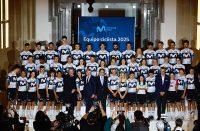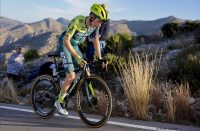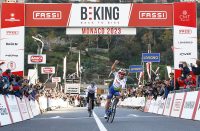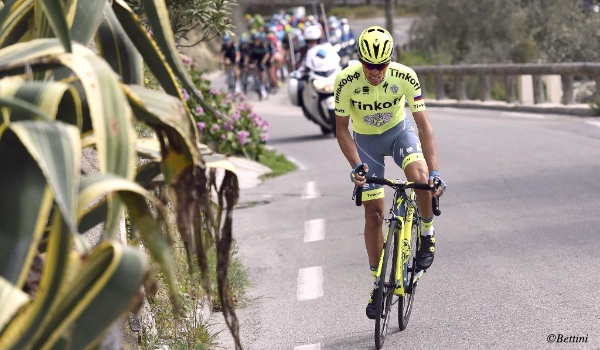
The three-time winner of the Vuelta al Pais Vasco – or ‘Tour of the Basque Country’ – returns to the race for its 56th edition. Alberto Contador, who won the race in 2014, 2009 and 2008 will lead a Tinkoff roster fresh from strong performances at the Volta Ciclista a Catalunya and Paris-Nice, where Alberto finished second in the GC in both.
This UCI World Tour race takes place over six days, with the opening 144km stage starting in Etxebarria in the centre of the Basque Country, ending with a time trial in Eibar, close to the race’s start town. The line-up pits Alberto against adversaries both from previous editions of the race, as well as earlier stage races from this season, on a parcours that could conservatively be called ‘undulating’. While the official route guide lists two mountain stages, the Basque Country is a mountainous area, and as such, only one stage does not include any categorised climbs – the final day’s time trial, and even this stage includes a 5km ascent. All of the other stages have at least one second category climb.
Having won the GC in the race on three occasions, Alberto is no stranger to the race and to the region, and has taken stage wins in each of the editions of the race in which he won the GC. In similar fashion to the recent Volta Ciclista a Catalunya, the Vuelta al Pais Vasco is a race for the climbers, and will be a strong indicator of form for the season’s Grand Tours.
Tinkoff’s leader heads to the race “eager and excited. The Vuelta al Pais Vasco is a race that I like a lot and in which I usually perform quite well,” he explains. “We have to see how the legs respond, because after Catalunya I focused myself on resting, as the effort is already becoming noticeable. This is the last race I do before the break that will precede my preparation for the Tour de France.
In what regards the race, Contador expects it to be “very tough, because all days are very, very demanding and we must be attentive.” He adds the factor of the weather, as the forecast calls for a rainy week. “In the Basque Country it always is an important factor,” he says, although he believes that in what concerns the way the race plays out, the rivals will be a key. “Above all we must take into account the rivals. It is a very close race and the level is very high, although the weather will play an important role, because they are stages that go up and down, and if the weather is bad, it will be even tougher.”
Joining Alberto in the Basque country is Sergio Paulinho, returning from an injury that developed at Paris-Nice, together with Danes Jesper Hansen and Michael Valgren. Playing a key role in the mountains will be Robert Kiserlovski and Roman Kreuziger, and the team is completed by the experienced Evgeny Petrov and Matteo Tosatto.
Sport Director Steven De Jongh explained the complications in finalising the team. “We had to make some last minute changes to the line-up as some of the guys were still suffering from sickness, but we’ve built a solid team around Alberto, who’s really motivated to go for the win here.
“We’ve got Roman Kreuziger and Robert Kiserlovski here, they will be our riders to be there with Alberto late on the key climbs, and Michael Valgren who comes to the race after a period of training so we hope he will be in good shape. It’s last minute for some of the line-up so we will have to wait and see how some of them are in the early stages. Sergio also returns from injury so we hope he’s now fully recovered.”
Looking at the stages that lie ahead next week, Steven commented: “Alberto is really focused for the race and our priority is fixed on supporting him as well as possible and having him in the best position overall ahead of the final stage time trial which starts with a climb before descending back down to Eibar.
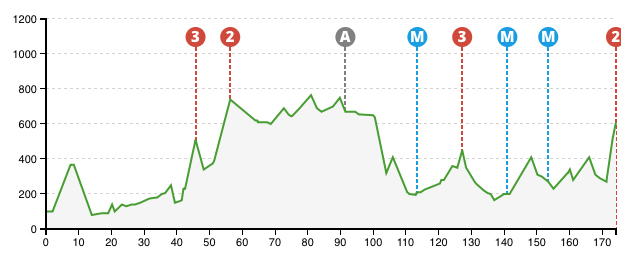
Stage 2 provides the first real test of the race.
“I think that stages 2 and 5 will be key in the fight for GC with the finish either at the top of a mountain of just after a final climb. However, the race is known for it’s tough stages and every day you need to be ready. We don’t have the favourite team for controlling the race so we will have to see how our position is after these key stages. Overall I’m curious to see how things will pan out.”
Finally, when talking about the Tinkoff line-up at the race, Contador said: “I have a great team with a lot of experience, but it’s true that due to injury and illness we had to change three riders that were initially scheduled. At this time of year this happens many times, but I will still have a great team alongside me and we are all very motivated.”
Race Route
The Vuelta al Pais Vasco covers a total of 853km over its six days, which is short when compared to similar stage races, however this is a race where difficulty is not measured in kilometres raced, but in the difficulty of the stages and the mountains climbed.
The first stage, which covers a route from Etxebarria to Markina-Xemein, covers no fewer than eight categorised climbs – one of these being the first category Alto de Ixua. This is not a race that eases riders into the mountains gently, but starts as it means to go on.
While not categorised as a mountain stage, stage 2 provides the race with three second category climbs over its 174.3km distance and its first uphill finish, the second category Garrastatxu. Stage 3 again takes in three second category climbs over the course of the 193.5km stage – which is also the race’s longest – with three categorised climbs coming in the final 30km, representing the opportunity for GC contenders to create time gaps before the flat stage finish.
The race enters the mountains proper on stages 4 and 5. While the profile of stage 4 appears relatively flat, it climbs 455m up the first category Jaizkibel in the first 30km, before ascending nearly 1,500m in categorised climbs over the remainder of the stage. The race’s queen stage more than doubles this, climbing nearly 3,500m over its 159km length – ending in what is potentially a race-deciding finish on the Usartzako.
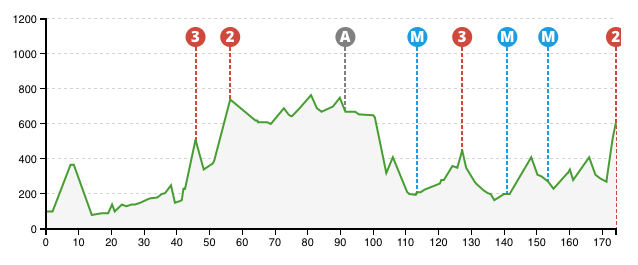
Stage 5, with eight categorised climbs
With the mountains out of the way, one stage remains – the 16.5km individual time trial in Eibar. Even this stage, while not having any categorised climbs, includes a 5km ascent. The race is far from over at this point – the race was won on the ITT in last year’s edition, and the hilly profile means that the time trial specialists won’t necessarily be certain to win here.

